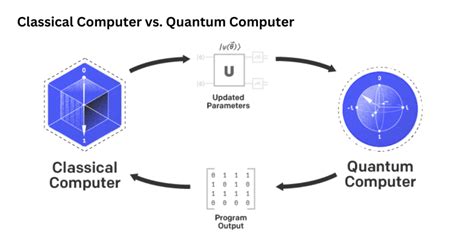Breaking News


Popular News


Explore the potential of quantum computing, from superposition to parallelism. Learn about applications, impact on cybersecurity, and future challenges.As technology continues to advance, the potential of quantum computing in solving complex problems is becoming increasingly evident. In this blog post, we will explore the various aspects of quantum computing and its applications in tackling intricate issues. First, we will delve into the fundamental concepts of quantum computing, aiming to provide a better understanding of this revolutionary technology. From there, we will discuss the harnessing of quantum superposition and the utilization of quantum entanglement for information storage, highlighting the remarkable capabilities these phenomena offer. We will also look at the promising potential of quantum parallelism for achieving faster computation and the application of quantum algorithms in problem-solving. Furthermore, we will consider the potential impact of quantum computing on cryptography and cybersecurity, as well as the challenges and future developments in this field. Join us as we embark on a journey to uncover the incredible potential of quantum computing.
Contents

Quantum computing is a cutting-edge field of study that involves the use of quantum-mechanical phenomena such as superposition and entanglement to perform data operations. Unlike classical computers that use bits to process information, quantum computers use quantum bits or qubits. These qubits can exist in multiple states at once, thanks to superposition. This allows quantum computers to process a vast amount of data simultaneously, making them highly efficient for solving complex problems.
One of the key principles that make quantum computing so powerful is superposition. In the quantum world, particles can be in multiple states at the same time. By leveraging this property, quantum computers can perform multiple calculations simultaneously, which significantly speeds up the computing process. This ability to handle numerous calculations all at once gives quantum computing a huge advantage over classical computing methods.
Another crucial concept in quantum computing is entanglement, where the quantum states of two or more particles are linked, even when they are separated by large distances. This phenomenon allows for the transfer of information instantly, making quantum communication much faster than its classical counterpart. In a quantum computer, entanglement can be used to link qubits, enabling them to work together in a coordinated manner, leading to even greater computational power.
In addition to these fundamental principles, quantum computing also employs the concept of quantum parallelism, which allows for the evaluation of multiple solutions to a problem simultaneously. This parallel processing capability can lead to a significant speedup in solving complex problems that are infeasible for classical computers to handle within a reasonable timeframe.

The Potential of Quantum Computing in Solving Complex Problems
Quantum superposition is a fundamental concept in quantum mechanics, and it forms the basis of the power of quantum computing. In traditional computing, bits can only exist in one state at a time – either a 0 or a 1. However, in quantum computing, qubits can exist in a superposition of both states simultaneously. This means that a quantum computer can process a vast amount of information in parallel, leading to the potential for exponential speedup in solving complex problems.
| Traditional Computing | Quantum Computing |
|---|---|
| Bits can only be 0 or 1 | Qubits can exist in a superposition of both 0 and 1 |
This ability to harness quantum superposition can revolutionize fields such as optimization, machine learning, and cryptography. For example, in optimization problems, a quantum computer can explore multiple solutions simultaneously, leading to faster and more efficient algorithms for finding the best solution. Similarly, in machine learning, the parallel processing capability of quantum superposition can be leveraged to train complex models much more quickly than classical computers.
The potential impact of harnessing quantum superposition is significant, and as quantum computing continues to advance, we can expect to see groundbreaking developments in solving some of the most complex problems across various industries.

The Potential of Quantum Computing in Solving Complex Problems
Quantum entanglement is one of the most fascinating phenomena in the field of quantum computing. It occurs when two or more particles become interconnected in such a way that the state of one particle instantly influences the state of the other, regardless of the distance between them. This property can be harnessed for information storage and transmission, as it allows for the creation of qubits that are inherently linked together, making them suitable for secure and efficient data storage.
By utilizing quantum entanglement for information storage, researchers are exploring the potential of creating storage systems that are resistant to external interference and highly secure. Traditional data storage methods are susceptible to various types of cyber attacks and data corruption, but quantum entanglement offers a promising solution to these challenges. The entangled qubits can be used to create quantum memory units that are more stable and reliable, ensuring the safety and integrity of stored information.
| Advantages of Quantum Entanglement in Information Storage |
|---|
| Enhanced Security: Quantum entanglement allows for the creation of highly secure data storage systems that are resistant to hacking and unauthorized access. |
| Data Integrity: Entangled qubits can maintain the integrity of stored information, reducing the risk of data corruption or loss. |
| Efficient Transmission: Information stored using quantum entanglement can be transmitted more efficiently, enabling faster data transfer and processing. |
In addition to its potential impact on information storage, quantum entanglement also holds promise for the development of advanced communication technologies. By leveraging entangled qubits, researchers aim to create communication networks that are faster, more secure, and more reliable than current systems. As the field of quantum computing continues to advance, the utilization of entanglement for information storage and communication is poised to revolutionize the way we store, transmit, and protect data.

Quantum parallelism is a fundamental concept in the field of quantum computing, and it has the potential to revolutionize the way we approach computational problems. Unlike traditional computers, which process information sequentially, quantum computers have the ability to process multiple calculations simultaneously through the concept of superposition. This means that quantum parallelism allows for a significant increase in computational speed and efficiency, enabling the potential for solving complex problems that are currently beyond the capabilities of classical computers.
One of the key advantages of quantum parallelism is its ability to explore multiple solutions to a problem at the same time. This is made possible through the use of quantum bits, or qubits, which can exist in a state of superposition, representing both 0 and 1 simultaneously. As a result, quantum computers can consider all possible solutions to a problem at once, whereas classical computers would have to evaluate each solution sequentially. This parallel processing capability holds great promise for tackling computationally intensive tasks, such as optimization problems and large-scale simulations, in a fraction of the time it would take with conventional computing methods.
| Traditional Computing | Quantum Computing |
|---|---|
| Sequential processing | Simultaneous processing through superposition |
| Single solution evaluation at a time | Consideration of multiple solutions in parallel |
| Limited scalability for complex problems | Potential for efficient resolution of complex problems |
It’s important to note that while quantum parallelism offers significant computational advantages, harnessing its full potential also comes with its own set of challenges. The delicate nature of qubits and the need for error correction mechanisms in quantum systems pose complex engineering and technical hurdles. Additionally, developing algorithms that can effectively leverage quantum parallelism requires a deep understanding of quantum phenomena and computational principles.

Quantum computing has the potential to revolutionize problem-solving by utilizing quantum algorithms. These algorithms are designed to operate on quantum computers, harnessing the unique properties of quantum mechanics to solve complex problems more efficiently than classical algorithms. One of the key advantages of quantum algorithms is their ability to leverage quantum parallelism, allowing for the computation of multiple possible solutions simultaneously.
Furthermore, quantum algorithms make use of quantum superposition, enabling quantum bits (or qubits) to exist in multiple states at once. This property allows quantum computers to explore a vast number of potential solutions in parallel, making them ideally suited for solving optimization and search problems.
In addition, quantum algorithms can also take advantage of quantum entanglement to store and manipulate information in ways that are not possible with classical computing. This allows for the development of innovative algorithms for tasks such as factorization and database searching, unlocking new possibilities for problem-solving in various fields.
As quantum computing continues to advance, the application of quantum algorithms in problem-solving is expected to have a transformative impact on industries such as finance, healthcare, and logistics. Quantum algorithms have the potential to tackle complex optimization problems, simulate quantum systems, and revolutionize machine learning, opening up new frontiers in solving some of the most challenging computational problems.

Quantum computing has the potential to have a significant impact on cryptography and cybersecurity. Traditional encryption methods rely on the factorization of large numbers and the difficulty of this process for classical computers. However, quantum computers can use quantum algorithms to quickly factorize large numbers, which could render current encryption techniques obsolete.
The use of quantum entanglement in quantum computing also poses a potential threat to cybersecurity. Entangled particles can communicate instantaneously across large distances, and this property can theoretically be exploited to break cryptographic protocols and gain unauthorized access to sensitive information.
In response to these potential threats, researchers and cryptographers are actively exploring new cryptographic protocols that are resistant to quantum attacks. One promising approach is the development of quantum-resistant cryptography that can withstand the power of quantum computers. This involves the design and implementation of encryption methods that remain secure even in the presence of quantum computing capabilities.
The potential impact of quantum computing on cryptography and cybersecurity underscores the need for proactive measures to address these emerging challenges. As quantum technology continues to advance, it is crucial for organizations and governments to prioritize the development and deployment of quantum-resistant encryption standards to safeguard sensitive data and communication networks.

Quantum computing has the potential to revolutionize the way we solve complex problems, but it also comes with its own set of challenges. One of the major challenges is the issue of maintaining the stability of quantum bits, or qubits, which are the basic units of quantum information. These qubits are extremely sensitive to their environment, and any interference can cause them to lose their quantum state. Researchers are working on developing error-correction techniques to address this challenge, but it remains a significant obstacle in the development of practical quantum computers.
Another challenge is the high cost and complexity of building quantum computers. The technology required to create and maintain the conditions necessary for quantum computation is expensive and difficult to scale. Additionally, the field of quantum computing is still relatively young, and there is a shortage of skilled professionals with the expertise needed to advance the technology. Addressing these challenges will require significant investment and collaboration across academic, government, and industry sectors.
In terms of the future of quantum computing, there is great potential for it to impact a wide range of industries, from healthcare and finance to cybersecurity and materials science. Quantum computers have the potential to solve complex problems at an unprecedented speed, making them particularly well-suited for tasks such as drug discovery, financial modeling, and optimizing supply chains. The development of quantum-safe encryption methods is also a key area of research, as quantum computers have the potential to break many of the cryptographic algorithms currently in use.
In order to fully realize the potential of quantum computing, researchers and engineers must continue to overcome the technical challenges associated with building practical quantum computers. As the field matures, it is likely that we will see quantum computing become an integral part of our technological infrastructure, with the potential to revolutionize industries and solve problems that are currently beyond the capabilities of classical computers.

What is quantum computing?
Quantum computing is a type of computing that takes advantage of quantum-mechanical phenomena such as superposition and entanglement to perform operations on data.
How is quantum computing different from classical computing?
Quantum computing uses quantum bits (qubits) which can exist in multiple states at the same time, allowing it to process a vast amount of data simultaneously, while classical computing uses bits which can only be in one state at a time.
What are the potential applications of quantum computing?
Quantum computing has the potential to revolutionize fields such as cryptography, drug discovery, financial modeling, and optimization problems by solving complex calculations much faster than classical computers.
What are the current challenges in quantum computing?
Some of the challenges in quantum computing include error correction, maintaining the stability of qubits, and scaling the technology to a practical and commercially viable level.
How far along are we in developing practical quantum computers?
While significant progress has been made in the field of quantum computing, practical and large-scale quantum computers are still in the early stages of development and are not yet widely available.
What are some key players and companies in the quantum computing industry?
Companies such as IBM, Google, Microsoft, and D-Wave are among the key players in the quantum computing industry, investing heavily in research and development.
What is the potential impact of quantum computing on society and technology?
The potential impact of quantum computing on society and technology is vast, ranging from breakthroughs in medicine and materials science to advancements in artificial intelligence and machine learning.